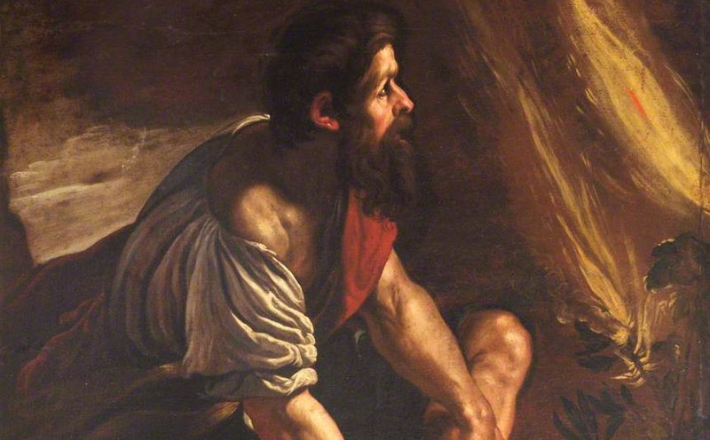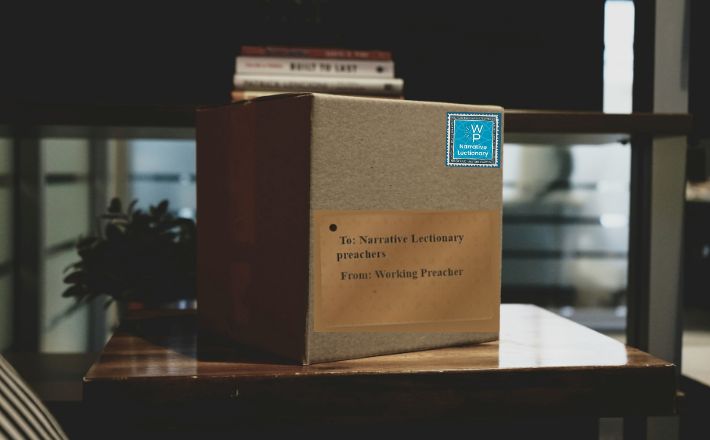Commentary on Exodus 2:23-25; 3:1-15; 4:10-17
The call of Moses is God’s invitation into the necessary, ethically challenging, and interdependent work of liberation.
It starts with the Israelites suffering under slavery. In ancient Israel and neighboring cultures, “slavery” (which comes from the Hebrew root ʿbd) could refer to a few different things. The slavery that the Israelites face is like corvée, when the government imposes labor on subjects for a period of time to complete projects.1 In this case, however, there is no set tenure for their work in building “supply cities,” and the whole point of the labor is for the oppressed to experience ruthless treatment (Exodus 1:10–14).
The severe oppression goes beyond slavery when Pharaoh commands genocide against newborn boys. All of this happens because a king fears the Israelites might be a threat. Why? The narrator says it is because this pharaoh “did not know Joseph” (Exodus 1:8), which most likely means he forgot the times when Joseph helped a previous pharaoh economically exploit masses of starving people (Genesis 47:13–26).
Think about that. Although we might wish the Hebrews were not subjected to such extreme violence, our moral compass should also steer us away from wishing that the Israelites were still doing the type of things that exempted them from being exploited before.
In the face of bitter oppression, there are women who resist: Midwives named Shiphrah and Puah save many lives, while Pharaoh’s daughter, a Levite, and that Levite’s daughter cooperate to save baby Moses (Exodus 1:15–2:10). Israelite survival depends on the courageous interethnic struggle of women counteracting the tyrant who uses deadly policies and fear-mongering rhetoric to manufacture an ethnic underclass.
At the start of our lectionary passage, that tyrannical king has died, but oppression continues; therefore, “the Israelites groaned under their slavery, and cried out” (Exodus 2:23). Most often, the Israelites “cry out” to their God, but there is no one addressed with this cry. Somehow, “‘their cry for help’ takes on a life of its own and works its way to God.”2
Now God (whose only action thus far was rewarding Shiphrah and Puah in Exodus 1:20–21) will take a more active role in the story.
God calls to Moses from a burning bush and reveals that God knows the suffering of God’s people. God promises to save them from their oppression and give them “a good and spacious land,” the land of the Canaanites, Hittites, Amorites, Perizzites, Hivites, and Jebusites (Exodus 3:2–8).
God’s listening to the downtrodden and desiring to emancipate them has been a powerful theological message for many people with their backs against the wall. However, it is also problematic. God plans relief—even flourishing—for the enslaved Israelites, which is all good and well. But it will come at the expense of dispossessing others.
For centuries, many Christians and (more recently) Jews have traveled to different places and used biblical passages about God’s promises (like this one) as a divine mandate to take land where other people are already living. Such uses of the Bible deserve scrutiny from a number of ethical, historical, political, and theological angles.
As far as biblical interpretation goes, at a minimum, I would raise questions about biblical authors’ and interpreters’ contexts and self-interests, how interpreters think about biblical authority, how to evaluate “good” interpretation, and the relationship of land promises to the major theme of exile running through the Bible.
Moses has questions of a different nature when God chooses him to free the people. First, he asks, “Who am I that I should go?” (Exodus 3:10–11).
Perhaps Moses is questioning his suitability for this task because his most recent ethnic identity crisis left him estranged from both Egyptians and Hebrews: he killed an Egyptian to help a suffering Hebrew, but other Hebrews did not see this as Moses having solidarity with them, and the Egyptians wanted to execute him for the homicide (2:11–15). In the verse before our lectionary passage, Moses takes the opportunity of his first son being born as a chance to recall his alienation (2:22). Maybe Moses is saying, “Who am I [as someone not embraced by Hebrews or Egyptians] that I should go [and adjudicate between them]?”
Or perhaps Moses objects because he believes he does not have the power to save anyone. God has a big plan but has not explained how Moses will be able to accomplish it.
God’s initial response is assurance that God’s presence will be the difference-maker: “I will be with you” (Exodus 3:12).
Next, Moses asks how to convince the Israelites that he has, indeed, met the God of their ancestors. What if the Israelites ask Moses the name of the God who sent him? There are other excellent Working Preacher commentaries (by Dennis Olson and Reed Carlson) that delve into the mystery of God’s self-revelation of the divine name. However, I would like to draw our attention to where our lectionary ends, with Moses’ final objection.
In his final objection, Moses expresses doubts about his speaking ability because, as the Hebrew literally says, “I am heavy of mouth and heavy of tongue” (Exodus 4:10; my translation). Some scholars interpret this phrase as describing a speech impediment, which would be a disability in Moses’ context. Moses believes that his disability disqualifies him from his calling.
God’s answer is a lesson in interdependence (the dependence of two or more beings or things on each other) as a theological value in the quest toward liberation.
First, Moses needs to learn that God is the one who appoints the differences in ability to humans. In God’s response, we do not see the Divine distinguishing abilities and disabilities as opposites or being valued differently: “Who gives speech to mortals? Who makes them mute or deaf, seeing or blind? Is it not I, the LORD?” (Exodus 4:12). All of it comes from God, the God who is counting on Moses as the conduit to bring manumitting miracles. God is depending on Moses. But God is also promising to be there to help Moses speak (4:13).3
When Moses still insists that someone else would be more fit for the task, God expresses anger but sticks with the lesson of interdependence. Yhwh explains that Aaron will rely on Moses for God’s word, and Moses will rely on Aaron to eloquently communicate with other people. In fact, Moses “shall serve as God to [Aaron]” (Exodus 4:14–16).
Thinking about interdependence, Sarah Wolf explains God’s point beautifully:
God is thus simply explaining to Moses that just like God can’t and doesn’t speak directly to most people, so too Moses does not have to do all the speaking himself. God not only reassures Moses that he will have support, but also admits to Moses that God’s own role is one that requires assistance, too.4
Notes
- The Hebrew root ʿbd can refer to a subservient position or service in a hierarchical relationship, like how God intends for the emancipated Israelites to “serve God on this mountain [Horeb/Sinai]” (Exodus 3:12). When it refers to enslavement, aside from the type of forced labor of the Israelites to Pharaoh, it can refer to chattel slavery (humans owned for life as movable property, like livestock; Leviticus 25:44–46) or debt slavery (a person in debt sells their own labor or a family member’s labor to their creditor; Exodus 21:2–11; Deuteronomy 15:12–17). See Dexter E. Callender Jr., “Servants of God(s) and Servants of Kings in Israel and the Ancient Near East,” Semeia, Slavery in Text and Interpretation, vol. 83/84 (1998): 67–82.
- Thomas B. Dozeman, Exodus, Eerdmans Critical Commentary (Eerdmans Publishing Company, 2009), 92–93.
- See the argument from one of my former students, Avery Arden (Hebrew Word Study: Does Exodus 4:10 Confirm Moses Was disabled?), and a couple of the sources they cite heavily: Nyasha Junior and Jeremy Schipper, “Mosaic Disability and Identity in Exodus 4:10; 6:12, 30,” Biblical Interpretation 16 (2008): 428–41; Jeffrey Tigay, “‘Heavy of Mouth’ and ‘Heavy of Tongue’: On Moses’ Speech Difficulty,” Bulletin of the American Schools of Oriental Research 231 (1978): 57–67.
- Sarah Wolf, “Why Did Moses Have a Speech Disability?” JTS Torah Commentary (Jan 20, 2023), https://www.jtsa.edu/torah/why-did-moses-have-a-speech-disability/.
PRAYER OF THE DAY
God of all people,
You remembered your children who were enslaved in Egypt, and by the power of your name you set them free. Remember us and free us from slavery to sin by the power of your name. Amen.
HYMNS
I heard the voice of Jesus say ELW 332
How sweet the name of Jesus sounds ELW 620
Dearest Jesus, at your word ELW 520
CHORAL
Here I am, Lord, Daniel L. Schutte



September 28, 2025